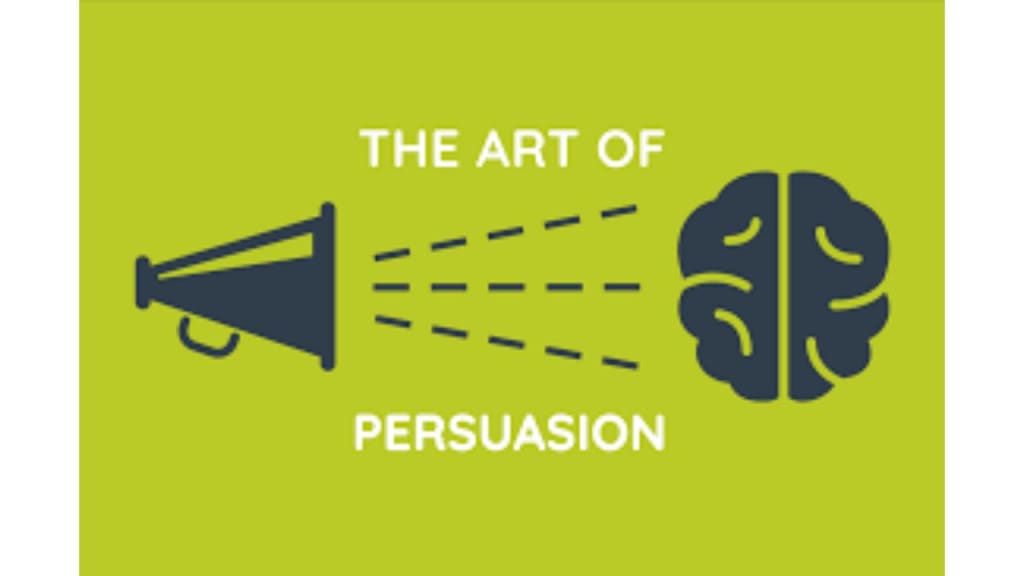The Art of Persuasion: How to Win People Over
Mastering the Psychology of Influence and Building Lasting Connections

Introduction:
Persuasion is an essential skill in various aspects of life, from business negotiations to personal relationships. The ability to effectively influence others can open doors, forge alliances, and create opportunities. In this article, we will explore the art of persuasion, diving into the psychology behind it and providing practical strategies to win people over and build lasting connections.
Understanding the Psychology of Persuasion:
To become a skilled persuader, it is crucial to understand the psychological factors that influence people's decision-making processes. Humans are driven by emotions, desires, and the need for social acceptance. By tapping into these motivations, you can enhance your persuasive abilities.
Reciprocity is a fundamental principle of persuasion. When you offer something of value to others, they feel obliged to reciprocate. By providing genuine help, useful information, or acts of kindness, you create a sense of indebtedness that can be leveraged in future interactions.
Social proof is another powerful aspect. People tend to follow the actions of others, especially those they perceive as similar or credible. By showcasing testimonials, endorsements, or examples of how others have benefited from your proposal, you strengthen your persuasive case.
Building Rapport and Trust :
Building rapport and trust are essential foundations for effective persuasion. People are more likely to be influenced by those they like and trust. To establish rapport, actively listen to others, show genuine interest, and find common ground. Empathy and understanding create a strong connection and make people more receptive to your message.
Trust is built through credibility and authenticity. Be knowledgeable, reliable, and transparent in your interactions. Demonstrate expertise and provide evidence to support your claims. When people trust you, they are more likely to accept your recommendations or proposals.
Additionally, pay attention to non-verbal cues such as body language and tone of voice. Match their energy and style to create a sense of familiarity and comfort. Mirroring their gestures and expressions subtly can establish a deeper connection.
Crafting Compelling Arguments :
To win people over, your arguments need to be persuasive and compelling. Start by understanding your audience's needs, desires, and concerns. Tailor your message to resonate with their specific motivations.
Use storytelling to engage emotions and create a relatable narrative. Stories have a powerful impact and can make your message memorable. Paint a vivid picture of the benefits and outcomes of accepting your proposal.
Additionally, back up your arguments with facts, statistics, or expert opinions. This provides a logical framework that reinforces your persuasive appeal. However, it is crucial to strike a balance between logic and emotions. People make decisions based on both, so appeal to both aspects to strengthen your case.
Anticipate and address potential objections proactively. By considering and preparing counterarguments in advance, you demonstrate that you understand the concerns and can provide well-reasoned responses. This approach makes you more persuasive and credible.
Overcoming Objections :
Even the most skilled persuaders face objections. Instead of dismissing objections, address them directly. Understand the concerns behind the objections and provide thoughtful responses. By acknowledging and validating their concerns, you show empathy and build trust. Responding with well-structured counterarguments can help overcome objections and strengthen your persuasive position.
Conclusion :
Mastering the art of persuasion requires understanding the psychology of influence, building rapport, crafting compelling arguments, and overcoming objections. By applying these strategies, you can win people over, forge meaningful connections, and achieve greater success in your personal and professional endeavors. Remember, persuasion is not about manipulation but rather about understanding others and presenting your ideas in a compelling and respectful manner. Practice these techniques, and watch





Comments
There are no comments for this story
Be the first to respond and start the conversation.